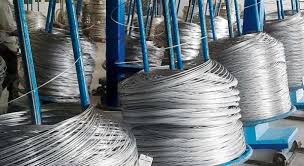Stainless wire, a versatile and indispensable material, has found its way into a myriad of industries and applications due to its exceptional properties. Made from pvc coated stainless wire rope, this type of wire combines the benefits of strength, durability, and resistance to corrosion, making it a preferred choice for many applications. This article explores the unique characteristics of stainless wire, its various applications, and the reasons behind its widespread use.
Properties of Stainless Wire
1. Corrosion Resistance:
One of the most significant advantages of stainless wire is its resistance to corrosion. Stainless steel contains chromium, which forms a passive layer of chromium oxide on the surface, protecting the material from rust and corrosion. This makes stainless wire ideal for use in environments where moisture and chemicals are present.
2. Strength and Durability:
Stainless wire is known for its high tensile strength and durability. It can withstand significant stress and pressure without deforming, making it suitable for heavy-duty applications.
3. Temperature Resistance:
Stainless steel can endure a wide range of temperatures without losing its properties. This makes stainless wire suitable for applications that involve extreme heat or cold.
4. Aesthetic Appeal:
The shiny, polished appearance of stainless wire adds to its aesthetic appeal. This makes it a popular choice for applications where appearance is important, such as in architectural and decorative uses.
5. Hygienic Properties:
Stainless steel is easy to clean and does not harbor bacteria, making stainless wire ideal for use in the food and medical industries.
Applications of Stainless Wire
1. Medical Devices:
Stainless wire is extensively used in the medical field for making surgical instruments, orthodontic braces, and other medical devices. Its biocompatibility, strength, and resistance to corrosion make it an excellent choice for these applications.
2. Construction and Architecture:
In construction, stainless wire is used for reinforcing concrete, making suspension bridges, and as a component in architectural structures. Its strength and resistance to the elements ensure longevity and reliability in these applications.
3. Automotive Industry:
The automotive industry uses stainless wire in various components, such as exhaust systems, airbags, and tire cord manufacturing. The material’s durability and resistance to high temperatures are crucial in these applications.
4. Marine Industry:
Given its excellent resistance to corrosion, stainless wire is extensively used in the marine industry. It is employed in making ropes, cables, and other components that are constantly exposed to seawater.
5. Food and Beverage Industry:
Stainless wire is used in the food and beverage industry for making equipment like conveyor belts, grills, and wire baskets. Its hygienic properties and resistance to corrosion make it suitable for contact with food and beverages.
6. Electronics:
In the electronics industry, stainless wire is used for making springs, connectors, and other components that require precise manufacturing and reliability.
7. Household Applications:
Stainless wire is found in many household items, such as kitchen utensils, wire racks, and furniture. Its combination of strength, aesthetics, and resistance to corrosion makes it ideal for everyday use.
Types of Stainless Wire
Stainless wire comes in various types, each tailored for specific applications:
- 304 Stainless Wire: Known for its excellent corrosion resistance and forming characteristics, this type is widely used in household and industrial applications.
- 316 Stainless Wire: Contains molybdenum, which enhances its resistance to corrosion, especially in marine environments. It is commonly used in the marine and medical industries.
- 430 Stainless Wire: Offers good corrosion resistance and formability, making it suitable for decorative and automotive applications.
- 904L Stainless Wire: High in nickel and molybdenum, this type provides superior resistance to acidic environments and is used in chemical processing industries.
Conclusion
Stainless wire is an exceptional material that plays a crucial role in various industries due to its unique properties. Its combination of corrosion resistance, strength, temperature endurance, aesthetic appeal, and hygienic properties makes it an invaluable resource in applications ranging from medical devices to construction, automotive, marine, and beyond. As technology advances and new applications emerge, the demand for high-quality stainless wire will continue to grow, further solidifying its place as a fundamental material in modern industry.


